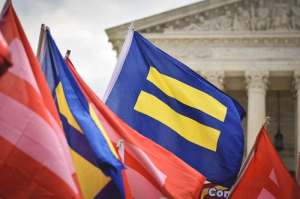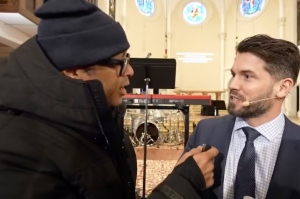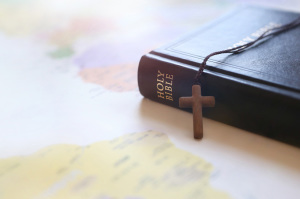A bipartisan proposal for voter integrity and photo ID’s

At the risk of sounding Pollyannish, I believe most Americans want our elections to be fair. I believe they want all eligible voters to have an opportunity to vote, and I believe they want an accurate count of the votes. How, then, do we deal with the new Georgia voting laws, which have triggered polar opposite responses from the left and the right?
From the perspective of the left, these laws are a blatant attack on poor Americans, in particular black Americans. From the perspective of the right, these laws are a sane effort to ensure fair elections, seeking to close up loopholes of abuse.
The Washington Postnotes that, “Opponents of Georgia’s new elections law call it a blatant attack on voting rights, aimed specifically at suppressing the minority vote that helped propel Joe Biden’s presidential win and gave Democrats two critical seats in the U.S. Senate.”
In stark contrast, Georgia governor Brian Kemp said, “I’m telling you the truth about this bill. It expands access.”
According to the Post, which can be expected to lean heavily to the left, “the law shows it does contain new restrictions on voting; some are likely to make it disproportionately more difficult for poorer voters and voters of color to cast their ballots.”
On the other hand, the Post observed, “It’s also correct that there are ways in which the law expands voter access, particularly in ways that will be visible in rural areas.”
How do we sort this out? And with so much passion on either side, is there common ground that can be found?
Former NBA star and now sports commentator Charles Barkley recently opined, “. . . I think our system is set up where our politicians, whether they’re Republicans or Democrats, are designed to make us not like each other, so they can keep their grasp [on] money and power.”
He added, “They divide and conquer,” in contrast with the populace as a whole, which be more unified on its own.
When it comes to Georgia’s new voting laws, it seems that almost no one is trying to bridge the gap. Instead, the rift is growing by the day, with Major League Baseball moving its annual All Star game from Georgia and former president Trump calling for a boycott of MLB (and Coca Cola, which also denounced the new laws).
At the same time, Democratic politicians like Sen. Raphael Warnock and former gubernatorial candidate Stacey Abrams are urging companies not to boycott Georgia. (And, of course, one could argue that it was the very policies of Abrams that caused these laws to be passed.)
How, then, do we move forward?
To be totally candid, I have never personally heard a single conservative leader even hint that he or she wanted to suppress the African American vote. Not once. Nor have I ever heard a conservative suggest that poor Americans should be deprived of their right to vote.
Instead, the call for every voter to have photo ID seems quite reasonable, providing a way to help safeguard against voter fraud. After all, as many have now pointed out, in order to pick up your will call tickets for an MLB game, photo ID is required.
Why, then, shouldn’t voters be required to provide the same? Is this too much to ask? And isn’t it racist to suggest that, on average, black Americans have less ability to get photo ID than other Americans?
I asked these questions to a black friend of mine who is an accomplished educator working in the inner-cities. (He is also a strong moral conservative and not a Biden voter.)
He replied, “If you look at the rate at which African Americans are able to acquire IDs needed for school, jobs etc., collectively, you will see that they have a much lower percentage of having these necessary items in urban and rural communities.
“There are difficulties with job scheduling (not even being able to take off for health reasons due to being fired or put on warnings), transportation (IDs are central to car ownership and one begets the other) and the knowledge of how to obtain these IDs (due to poor documentation of birth certificates and social security cards).”
He continued, “Now, this is not all Black folk but for many caught in the rat race of life these are basic challenges. Having worked with students in private day settings where they have little family support, or in the system . . . they couldn't even register to vote, get health care etc. because of their inability to provide documentation that people in your demographic are born with.”
“So, requiring IDs to Black folks shuts down a large segment of the community which already has difficulty voting and will just be another preventative measure to keep them from the poll.”
This helps give perspective to those who feel that the Georgia laws are unfair and are targeting blacks. On the flip side, since photo ID is required for so many basic life functions (including picking up pre-ordered tickets at a baseball game), it seems entirely reasonable to require this for voting.
The solution to this impasse seems simple enough, especially given the American spirit of “where there’s a will, there’s a way.”
If my premises are right, namely, that most Americans want every eligible voter to have the ability to vote and that most Americans want all votes to be counted accurately, why not put the emphasis on helping every eligible voter get valid photo ID? Why not do our best to level the playing field and safeguard against cheating at the same time?
The political establishments on the left and right might not be so keen to do this, but I believe most Americans would be in favor. Am I too Pollyannish in thinking like this?
Dr. Michael Brown (www.askdrbrown.org) is the host of the nationally syndicated Line of Fire radio program. He holds a Ph.D. in Near Eastern Languages and Literatures from New York University and has served as a professor at a number of seminaries. He is the author of 40 books. Connect with him on Facebook, Twitter, or YouTube.



























